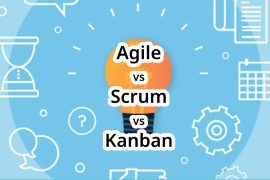BaaS is the short form of Blockchain as a service. It refers to a cloud-based service model that allows individuals and organizations to develop, operate, and host blockchain applications without the need to set up and look after their own blockchain infrastructure. BaaS providers give you a platform that has the necessary tools and resources to create and manage blockchain networks and applications.
Table of Contents
Key Features of Blockchain as a Service

1. Infrastructure Management: BaaS providers look into the complexities of blockchain infrastructure, such as security, scalability, and network nodes, so users can focus on building and deployment of blockchain applications.
2. Development Tools: BaaS platforms usually give you software development kits (SDKs) and APIs to facilitate the formation of decentralized applications (dApps).
3. Smart Contracts: The development and execution of smart contracts is supported by BaaS. These are usually self-executing agreements with predefined rules and conditions that run on the blockchain.
4. Security: BaaS providers implement security features and best practices to safeguard the blockchain network and the data that it carries
5. Integration: BaaS services are able to integrate with other cloud services and databases, so existing applications can adopt blockchain, easily.
6. Cost Savings: BaaS can be cost-effective because users don’t have to invest in their own blockchain infrastructure, something that is complex and costly to maintain.
BaaS is particularly useful for organizations that want to experiment with blockchain technology, develop proof-of-concept projects, or integrate blockchain into their existing systems without committing extensive resources to building and managing a blockchain network from scratch. It simplifies the process of adopting blockchain technology and allows businesses to focus on their core applications and use cases.
Blockchain as a Service (BaaS) has several advantages for individuals and organizations looking to use blockchain technology without the complexities of setting up and maintaining their own infrastructure.
Some of the Vital Advantages of BaaS
Ease of Use: BaaS platforms by design, are user-friendly, so developers and businesses can create, deploy, and manage blockchain applications without needing to know blockchain technology in-depth.
Cost-Efficiency: BaaS removes the need for investment and maintenance of expensive blockchain infrastructure. Users can subscribe to the service and pay for what they use, so there is reduced upfront capital expenditure.
Rapid Development: BaaS provides pre-built templates, smart contract libraries, and development tools, making the development process for blockchain applications faster.
Scalability: Many BaaS providers offer scalable solutions, so businesses expand their blockchain networks according to their growing needs.
Security: BaaS platforms also encompass built-in security features, such as encryption, access controls, and identity management, so they can protect the blockchain network and data from unauthorized tampering or access.
Interoperability: BaaS services can integrate with other cloud services and databases, so current blockchain applications can work with existing systems.
Reduced Maintenance: BaaS providers oversee the technical aspects of maintaining blockchain infrastructure, including software updates and node management, so users don’t need to take care of such responsibilities.
Technical Support: BaaS services usually come with technical support and documentation so users can resolve issues and understand the platform.
Faster Time to Market: With BaaS, organizations can bring their blockchain projects to market more quickly, as they can take care of the application’s development and functionality instead of focusing on the underlying blockchain infrastructure.
Experimentation: BaaS is best for experimenting with blockchain technology and prototyping new use cases without committing to full-scale use.
Reduced Risk: BaaS can bring down the risk associated with blockchain implementation, as users can start with a lower upfront investment and check whether the technology aligns with their needs.
Regulatory Compliance: Some BaaS providers give you features for regulatory compliance and data management, which is indispensable for businesses operating in regulated environments.
Global Reach: BaaS providers have a presence worldwide, so users may deploy blockchain networks and applications in multiple regions, globally.
One can say that BaaS makes the adoption of blockchain technology easier, making it accessible to a broad range of users and companies. It may be particularly useful for businesses aiming to harness the benefits of blockchain without the technical complexities and costs that come with building and managing their own blockchain infrastructure.
Top 10 BaaS Platforms

IBM Blockchain Platform: IBM has a 360-degree BaaS solution with enterprise-grade features, like tools for scaling, managing, and creating blockchain networks.
Microsoft Azure Blockchain Service: Coming with a package as part of the Microsoft Azure cloud platform, this service gives you tools for building, managing, and deploying blockchain applications on Azure.
Amazon Managed Blockchain: Amazon Web Services (AWS) gives you a managed blockchain service that works in conjunction with popular blockchain frameworks like Ethereum and Hyperledger Fabric.
Oracle Blockchain Platform: Oracle’s BaaS solution is great for enterprise blockchain applications, providing tools for network setup, smart contract management, and development.
SAP BTP (Blockchain as a Service): SAP gives you blockchain services that integrate with its broader Business Technology Platform (BTP) for businesses that want to incorporate blockchain into their operations.
Alibaba Cloud Blockchain as a Service: Alibaba Cloud offers a BaaS solution that works with various blockchain frameworks, along with enterprise-grade security and management tools.
Baidu Blockchain Engine: A Chinese tech giant, Baidu, gives you a BaaS platform for building and deploying blockchain applications.
Chainstack: Chainstack is a blockchain management platform that allows for multiple blockchains, making it easier to setup and manage blockchain networks.
R3 Corda BaaS: R3’s Corda platform is the choice for businesses in finance and other industries, and offers a BaaS solution for Corda-based networks.
NEM NIS1 BaaS: NEM, famous for its blockchain platform, offers a BaaS solution for businesses to build and deploy applications on the NEM NIS1 blockchain.
Since the landscape of BaaS platforms is dynamic and new providers keep entering the market, or existing ones keep enhancing their services, you must consider your specific requirements when selecting a BaaS platform. Consider the blockchain framework you want to work with, scalability needs, regulatory compliance, and integration capabilities of the platform you want to use. Also, read the most current information and user reviews so you can make an informed decision.
Future of Blockchain as a Service (BaaS)
The future of Blockchain as a Service (BaaS) looks good as blockchain technology keeps evolving and finding applications in various industries. Here are some insights, and potential trends and developments that may shape the future of BaaS:
Increased Adoption: BaaS may experience increased adoption as more organizations learn about the benefits of blockchain technology. This includes not only businesses but also government agencies, other entities, and non-profits.
Diverse Use Cases: The instances of use for BaaS will continue to grow across different sectors. While financial services and supply chain management may have adopted BaaS early, industries such as healthcare, voting systems, and real estate may increasingly use blockchain applications.
Interoperability: Interoperability between BaaS platforms and different blockchains will become more critical. Efforts to connect and integrate different blockchain networks to facilitate data exchange and transactions are likely to be implemented.
Integration with IoT and AI: BaaS can be integrated with Artificial Intelligence (AI) and the Internet of Things (IoT) technologies to create more complex applications. This combination of technologies ensures smart contracts and data verification in IoT ecosystems.
Standardization: As the blockchain space matures, standards for smart contracts, data formats, and blockchain interfaces may develop, so interoperable BaaS systems become easier.
Scalability Solutions: For many blockchain platforms, scalability remains an issue. BaaS providers will have to keep developing and implementing scalability solutions to support the growing demands of enterprise-level applications.
Privacy Enhancements: Privacy-preserving technologies, like zero-knowledge proofs and confidential transactions, will have a larger role to play in BaaS, in order to meet regulatory and privacy requirements.
Regulatory Compliance: BaaS platforms may increasingly focus on providing tools and services that assist users in adhering to regulatory requirements, more so for industries that have strict compliance standards.
Enhanced Security: With the increasing importance of blockchain in securing data and transactions, BaaS providers will put a strong emphasis on robust security practices and features.
Environmental Sustainability: Sustainability issues related to the energy consumption of blockchain networks, especially for those using proof-of-work consensus, may increase the implementation of more eco-friendly consensus mechanisms and sustainability practices in BaaS.
Cross-Chain and Cross-Platform Solutions: BaaS platforms may formulate tools and services that allow for seamless communication and interaction between different blockchains, so the whole blockchain ecosystem is interconnected and versatile.
Deeper Integration with Traditional Systems: BaaS providers will look towards integration solutions with existing enterprise systems, so businesses can easily incorporate blockchain into their operations.
Conclusion
The blockchain space is constantly evolving, and the future of BaaS will depend on different factors like technological advancements, market demands, and regulatory developments. Stay abreast with the latest trends and opportunities in the BaaS space so you can closely follow developments in the blockchain industry and check out the offerings and capabilities of BaaS providers.






